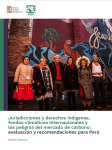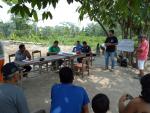
Kichwa Indigenous Defender Quinto Inuma Murdered Amidst the Peruvian State’s Inaction and Negligence
30 Nov 2023
The Amazonian Indigenous movement is in collective mourning for the loss of Quinto Inuma Alvarado, a much admired and prominent Kichwa leader of the Santa Rosillo de Yanayacu community, in the San Martin region of the northern Peruvian Amazon. Quinto Inuma was a tireless defender of the human rights and territory of his community.














